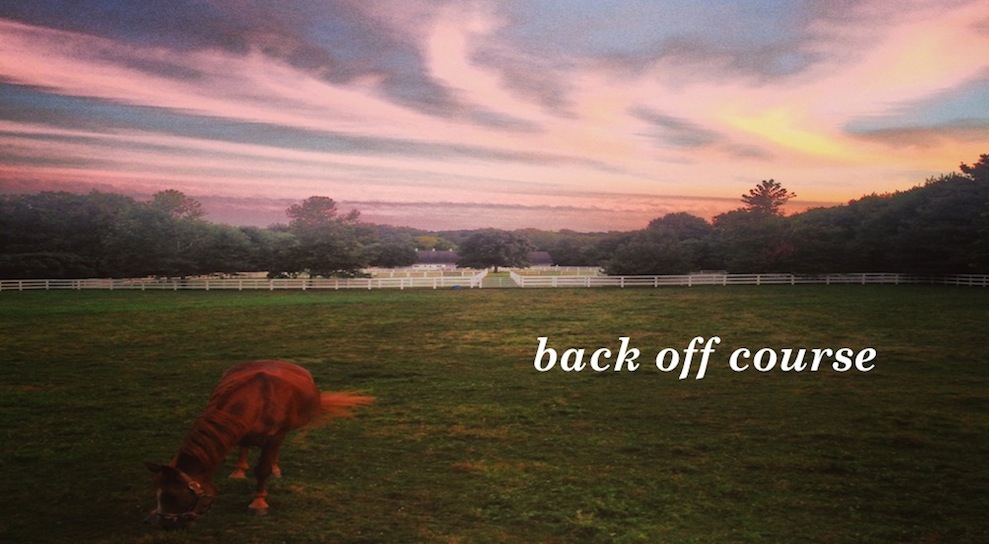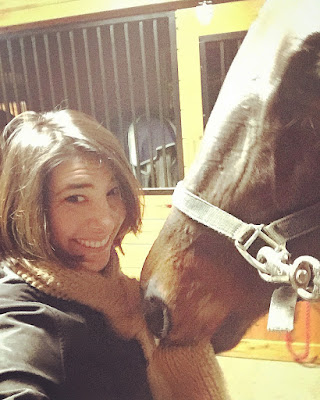Recently
this article showed up on my timeline, memorializing a Manhattan Appeals Court's decision dismissing a plaintiff's complaint against the Bronx Equestrian Center for injuries the rider sustained after falling off while riding along a "bridle path". Many people may be surprised to learn that simply alleging negligence against an owner, operator, or trainer of horse-back riding facility will most likely not survive to result in any type of award.
Although I'm not certain on the entirety of the
law in New York in this area, in both New Jersey and New York riding is first treated like any other recreational sport in that the participant
assumes certain risks just by partaking in the activity. Secondly, riding is treated like an inherently dangerous activity, and operators are required to post a sign conveying to participants the risk they are undertaking simply by agreeing to participate. This includes risk of serious injury and death.
Those of us who have been riding for a while know and understand these risks as a daily thing we must accept if we want to continue pursuing our passion. Sometimes, that makes it difficult to understand how newcomers to the sport may not immediately appreciate the risks they accept simply by agreeing to climb onto a horse's back and go for a trail ride. I believe that my readers and I would agree that if someone on the road adjacent to the farm at which you ride littered a plastic bag, and the wind carried that bag into the riding arena, spooking your horse, and causing you to fall off, you would have a very bad case against your trainer or barn owner if you tried to recover for your injuries. Why? Because the horse is an uncontrollable and unpredictable animal that will react to things that occur in it's surroundings. Although I know our trusty school pony Diamond would never spook at a bomb going off, nonetheless at a plastic bag, it's true that we can never really be sure. Further, no one can really predict or prevent that plastic bag from entering into the riding arena at the right moment to spook your horse and cause you to fall off. Seasoned riders will attribute this experience to bad luck, and perhaps use the opportunity to school their horse around plastic bags, understanding that this could occur again in any number of circumstances.

However, a person new to riding may not understand any of this. To them, the horse "went crazy" and simply "took off bucking". To them, the horse acted completely outside of predicted behavior, and caused them to fall off and become injured. In all fairness, in many circumstances a patron could file suit against a provider of services if that provider knew or should have known that certain foreseeable risks would result. For instance, the patron of a grocery store or nail salon could be sued if they provided an unsafe condition or an unsafe product that resulted in injury, they were on notice of that risk, and that risk was not remediated. In that same vein, an injured rider may argue the trainer knew or should have known that litter blowing into the arena could cause the horse to spook and result in injury to the rider. But riding, as an inherently dangerous activity, is inseparable from the risk of bodily harm or death. As kind and mellow as some school horses may be, there is no way to separate riding a horse from the risks that come along with it. As most horse people know, anything can happen.
Although its always a good idea to have new participants sign a
release form, the law generally protects trainers, owners and operators from some common accidents that can occur while riding. However, that is not the case for all things that can occur while riding. In order to recover for any serious injuries in New Jersey you are better off alleging some type of recklessness of the part of the person responsible for your safety while riding. For example, although the plastic bag incident is not enough to sustain a claim, perhaps if you were a first time rider placed on a 2 year old colt fresh off the racetrack, and sent out on a trail by yourself when it was 30 degrees out and raining you would have a pretty good case. You would also probably fall off and kill yourself within 30 seconds...
Okay, that may be an exaggerated account of recklessness, but to fully understand the concept you get what I mean. It has to be the type of egregious conduct that the responsible person is virtually certain will result in injury. I see examples of this the most with older wealthy clients being placed on very expensive horses that are simply outside of their ability level. Another way I see this is with parents insisting on having their children compete at a level much higher than they are prepared for and much more difficult than their horse can handle. So trainers and barn owners, don't get too comfortable. Although cases like the one in the Bronx may make you feel insulated from lawsuits, recklessness will permeate any insulation.
Besides suing trainers and barn operators, a whole additional level of difficulty arises when you bring suit against a public entity. Immunities, limitations, and other bars to suit exist expressly to protect public entities from being sued for negligence and other causes of action. This adds one additional layer of difficulty in any case brought against a trainer owner or operator of a riding facility owned by the city or state. Not only will you have to show you did not assume the risks, that there was recklessness and that your injures were caused by that recklessness, you will also have to overcome any immunities or limitations imposed by the state.
I wrote about this subject briefly in 2014 in an
article with respect to drugging violations. See the excerpt
below:
With equestrian sport, regardless of discipline, comes the inherent risk of injury or death
that naturally accompanies any activity involving a large animal with a mind of its own. 9
Risk is present irrespective of a rider's years of experience, therefore making ownership of a
horse not necessarily equivalent to expertise or ability of the participant. 10 While safety should
always be a primary concern, it is often overshadowed by its more glamorous counterpart:
winning.
Equestrian sport's several disciplines are each derived from separate origins and focused
on distinct equine breeds, as well as unique methods and techniques of competition. The
equestrian discipline of show jumping is sub-divided into three categories: hunters, jumpers, and
equitation. 12 Unlike the jumper divisions, where speed and agility are valued by rewarding the
valued for being steady, calm and well mannered. "Temperamental horses with unnecessary
movement or exuberance show poorly," and stand very little chance at a prize.
However, the evolution of this standard is becoming increasingly worrisome. "The
hunter norm has become an eerily quiet and slow-motion horse with an exaggeratedly careful
jump . . . " The result is an environment that encourages "' longe[ing] till dead,' crippling
shoeing, and horses getting a list of meds [sic] as long as your arm every day." Not only do
calming drugs increase a horse's chance at a win, but they allow difficult horses to be ridden by
less skilled riders that simply pay to compete, regardless of their ability. This practice has aptly
been described as "putting training wheels on a horse." In part, horses traversing the ring in a
lethargic state have become a benchmark for success in the hunter and equitation rings.
The common practice of overmedicating and over training horses has resulted in creating
an uneven playing field in the sport, and has the effect of increasingly endangering the safety of
both the horse and rider.
Seldom mentioned in any article, blog, or news post is the obvious pressures trainers
experience from wealthy, untalented, or undedicated riders and owners. The idea that most, if not
all, drug violations are for the sole purpose of maintaining happy clients and sponsors has
become a taboo subject. Show jumping, much like horseracing, is a sport supported by owners
and sponsors who view their horses as investments and are known to take extreme measures to
gain a competitive advantage, including the abuse of performance-enhancing drugs.















